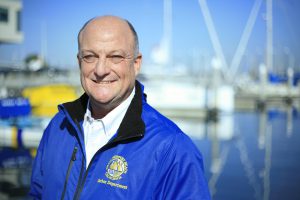
Home to everything floating from boogie boards to mega-yachts, swimmers to fishermen, and a rich marine and avian life, Newport Harbor is considered one of the premier yacht harbors in the United States. The harbor is home to more than 9,000 boats, 200 species of birds 80 types of fish, and a handful of pesky sea lions.
It’s a dynamic environment with many entities interested in and dedicated to its grandness: city management, the Harbor Department, law enforcement, various other agencies, residents, citizens, yacht owners, visitors, mooring permittees, the Harbor Commission, shoreside businesses, and a variety of others.
Coordinating all of this is Newport Beach Harbormaster Kurt Borsting, who has been on board with the city since December of 2018.
Borsting received a Bachelor’s degree in Political Science from CSU Long Beach, and then a Master of Science degree in Higher Education Administration from the University of Central Missouri.
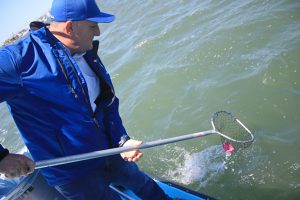
— Photo by Sara Hall ©
Before joining the City of Newport Beach, he served four years as the Superintendent for Marine Operations with the City of Long Beach, helping manage their large recreational marinas (Alamitos Bay Marina and Shoreline Marina), high volume launch ramp facilities, as well overseeing agreements between the City and commercial charter boat operations in the City’s Rainbow Harbor facilities, near Long Beach’s downtown and convention center district.
Borsting and his wife, Elizabeth, live in Belmont Shores but spend a lot of time in Newport Beach. Son Jake completed his undergraduate degree from San Francisco State University, while daughter Katie just finished her junior year in high school.
Now that the weather is getting warmer and people venture out to enjoy the local waters, we asked Borsting about his daily duties and if the pandemic had caused any changes to his routine.
Q: What are the challenges facing Newport Harbor?
A: Our motto in the Harbor Department is to serve as “Ambassadors to Newport Harbor.” With the onset of the recent Covid-19 virus, and the subsequent stay at home orders, the department needed to temporarily refocus that mission. While continuing our “Ambassador” role, our staff increasingly also served in “Harbor Caretaker” roles, monitoring the condition and safety of hundreds of vessels stored on moorings throughout the harbor, during a period when vessel owners were not in a position to come out to the Harbor to care for their boats.
As the Covid-19 event has continued, and recreational boaters have begun using the Harbor again, our team has worked to educate and encourage responsible social distancing practices on the water. Techniques such as: boating only with members of one’s immediate households; traveling directly from home and back (before and after boating); maintaining appropriate distance from others when using public docks, fuel docks and launch ramps; and not engaging in raft-up activities (where multiple boats anchor and tie to one another for socializing). Those are all ways individuals and families can enjoy the beauty of the Harbor and the outdoors safely, while also advancing broader public health goals.
Q: What is a typical day of management and patrol?
A: One of the most fun things about working in the Harbor Department, is that there really isn’t a “typical day.” Our team manages approximately 800 off-shore and 400 on-shore moorings, all of which are available to local boaters through use permits issued by the City. On any given day, our team members may be asked to assist a new boater in navigating the mooring fields, as they tie off to their assigned mooring ball for the first time. Later that same staffer may be sent to ‘shoo off’ sea lions discovered lounging on someone’s boat or private dock before they cause damage. Then, crew may be off to help a visitor to Newport Beach who’s lost their way while kayaking or paddle boarding and they need directions on how to head back to one of the local rental shops.
Whatever the day brings, our team’s focus is on providing quality service and advancing the responsible shared use of the Harbor for visitors and locals alike—those who earn their living on the water, and those who call Newport Harbor their home.
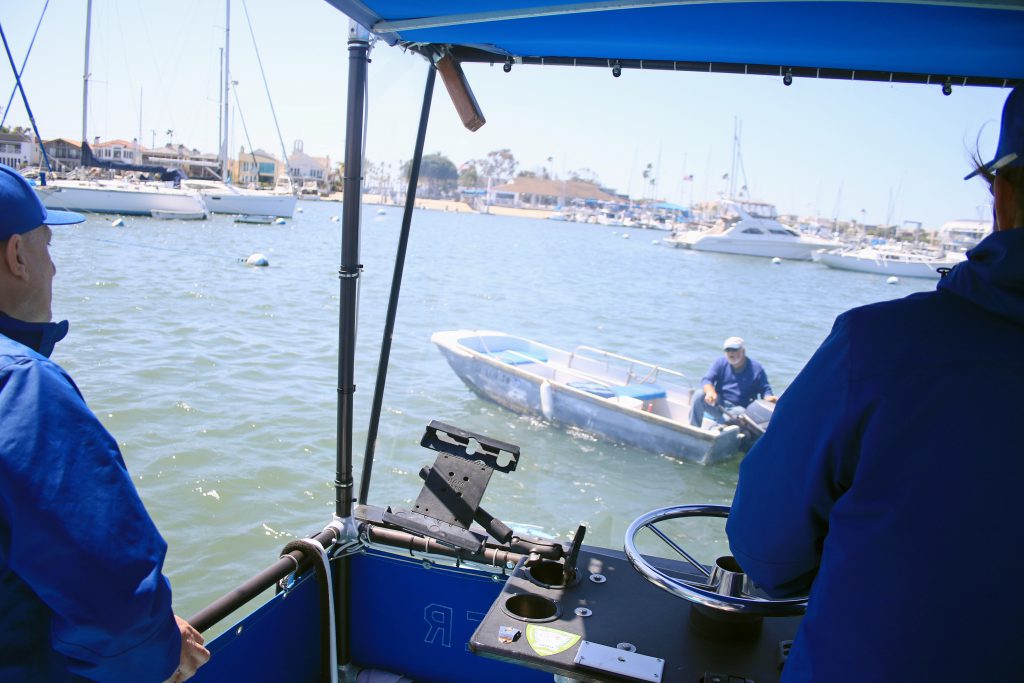
Q: What areas of the harbor are not in your jurisdiction?
A: The Harbor Department’s primary areas of responsibility are sections of the harbor within “City Tidelands” (largely defined as the lower sections of the bay south of Pacific Coast Highway). “County Tidelands” (largely comprised of the Back Bay area north of PCH and some other areas) are under the oversight of the County of Orange, with staffing provided by the OC Sheriff’s Department. In addition, there are Federal channels and various aids to navigation within the Harbor that are maintained by the Army Corps of Engineers and the US Coast Guard. The City is fortunate to have strong and cooperative working relationships with all these agencies.
Q: How far into the Upper Bay do you patrol?
A: Our team’s focus is primarily within the City Tidelands areas. We conduct regular patrols of the mooring fields, navigational channels, island parameters, public anchorage (east of Lido Isle), turning basin (west of Lido Isle), West Newport canals, and the Harbor’s entrance. We do not patrol north of the PCH Bridge.
Q: How many boats does your department operate in the harbor?
A: The Harbor Department operates three patrol boats, which are typically all in service throughout the day and into the early evenings. The Harbor Department is a seven-day a week service provider, with on-water staffing 363 days a year. No scheduled services take place on Christmas Day or New Year’s Day, but on-call services remain available both days.
Q: How is your department financed and what is your annual budget?
A: Harbor Department operations and improvement projects are supported with user fees, not tax dollars. Fees and charges from harbor operations such as mooring permits, slip rentals, and other revenue sources go into the Tidelands Fund, which supports the Harbor Department operations and capital projects in the Harbor area.
The Harbor Department manages a $1.4 million operating budget. This budget supports salaries and benefits, operational costs associated with patrol activities and mooring field administration, management of the City’s guest slips at Marina Park, care of public docks and waste pump out equipment located throughout the Harbor, the City’s liaison role with businesses operating with the Harbor, and third-party contracted operations of the City owned Balboa Yacht Basin marina.
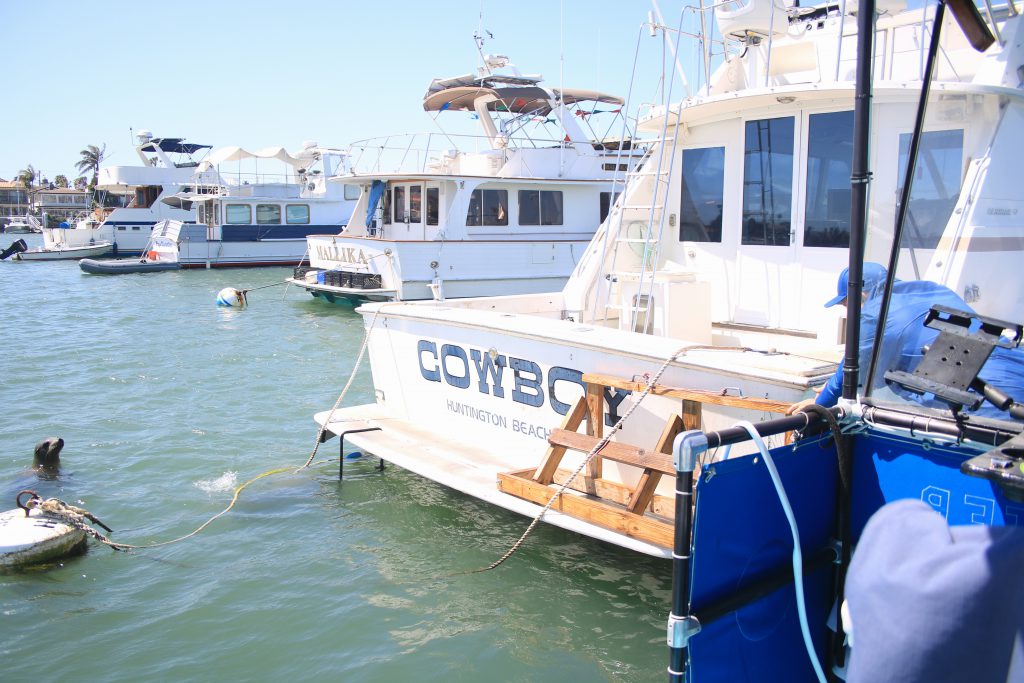
Q: How many different local/state/federal agencies do you have to deal with
A: While the Harbor Department’s core function is to support the safe and enjoyable shared use of Newport Harbor, various other local, state, and federal partners also conduct their operations within the bay. Some examples include: the U.S. Coast Guard, who call Newport Harbor home port for the cutter vessel Narwhal; and the OC Sheriff’s Department Harbor Patrol Bureau, whose main base of operations for the county is in Newport Harbor. Peer departments from within the City, which also support the Harbor, include Fire/Lifeguards, Public Works, and Community Development. Our office is fortunate to have strong working relationships with all these internal and external offices.
Q: How do you handle the laws and regulations of your department?
A: In general, the Harbor Department staff attempts to take an ‘educate first’ and ‘enforcement second’ philosophy when administering the City’s municipal codes associated with the Harbor. The City’s Harbor Commission helped advance this philosophy in the past year, by conducting a cover-to-cover review of all Harbor related codes. Following their review, the Commission advanced recommended updates to the City Council for their consideration. This review included high levels of community input, which helps citizens and harbor users better understand the reasons for many of the local laws that govern the Harbor’s use.
Q: Any challenges with enforcement?
A: Sometimes (but rarely) there can be conflicts with established Harbor rules, and requests for certain types of Harbor uses. As an example, Newport Harbor is considered a “No Wake” Harbor, which speed limits of 5 MPH or less. This is a critically important operating principle, that reinforces not only safe use of the busy Harbor, but also the protection of private property—docked and moored vessels and private dock systems throughout the Harbor could be subject to damage caused by wakes. On occasion, on-water event organizers (such as rowing regattas) will request approval to host programs where participants exceed the established speed limit. Managing such conflicts, by evaluating the likelihood of whether such a vessel would create a wake, ensuring adequate safety plans are in place to properly route and oversee the activity, along with consultation with local law enforcement has been very effective in managing such conflicts.
Q: How “healthy” is the harbor in terms of water quality and marine/avian life?
A: Newport Harbor is quite healthy, with water quality efforts consistently yielding high ratings. Boater education efforts and strong voluntary compliance by users not introducing waste materials or other pollutants into the bay help these results. Improved techniques and standards in areas such as capturing upstream pollutants before they reach Newport Harbor, volunteer clean-up efforts, and protection of ell grass beds contribute to improved water quality and bio-diversity in the Harbor.
Q: Are there any safety issues within the harbor that are of regular concern?
A: Yes. Our shared duty is to promote responsible boating while in Newport Harbor. Making sure your vessel has the adequate number of personal floatation devices for all persons aboard, confirming vessels are safe and properly equipped, not overcrowding passengers, and adhering to the Harbor’s “No Wake/5 MPH Speed Limit” are examples of how safety always needs to be a boater’s top priority.
Q: Do you have any jurisdiction over boating safety?
A: Yes. The Harbor Department plays an important role with managing boating safety. Using administrative tools available to the Department, such as permit issuance processes, boating safety expectations outlined in City municipal codes, as well as State and Federal boating requirements are reinforced locally.
Q: Do you have enforcement powers
A: Yes. A full-time code-enforcement officer is assigned to the Harbor Department. And while that staffer’s approach is generally “educate first” and “enforce second,” the Department may issue warnings, corrective notices, fines and citations, as well as having the authority to revoke city issued Harbor Permits when required. Thankfully, effective educational efforts along with broad levels of community support of existing Harbor rules reduces the need for the Harbor Department to utilize its enforcement authority.
Q: Does the harbor master have control over private docks and commercial docks?
A: City municipal codes do apply to private docks and commercial operations in the Harbor. While in many situations the City’s Public Works and Community Development Department lead in the administration of these areas, the Harbor Department also assists.
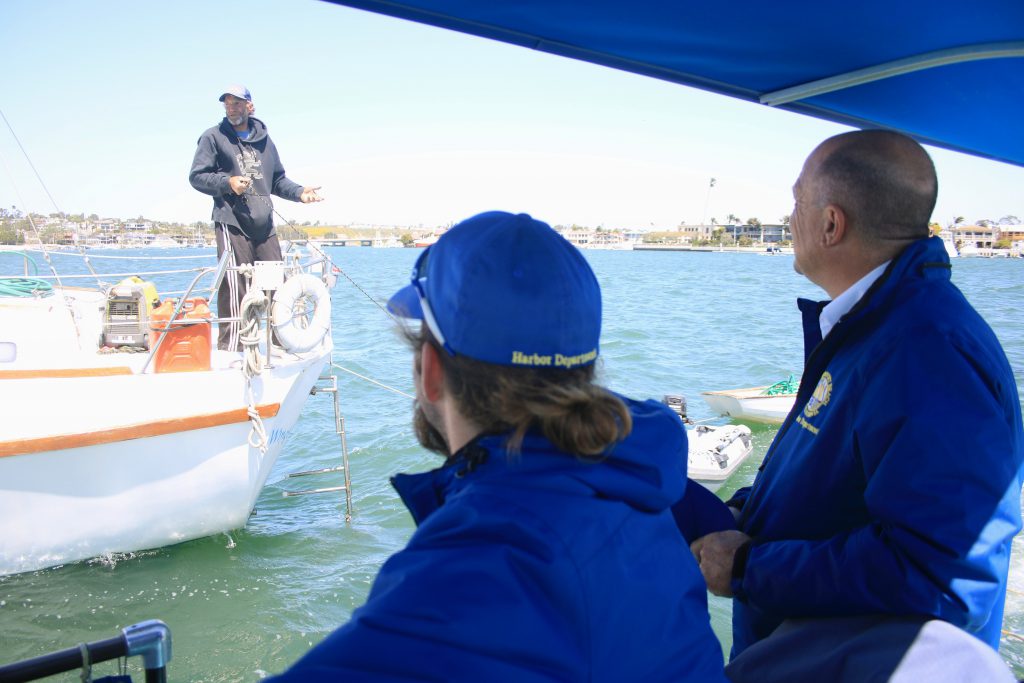
Q: What are the challenges with moorings?
A: The City issues permits for more than 800 off-shore moorings and 400 on-shore moorings in the Harbor. Moorings provide a unique and affordable on-water storage solution for boaters quite different from traditional built environments such as marinas, docks or dry storage facilities. While tranquil, charming and more affordable, moorings also come with unique challenges, including lack of convenient access, lack of infrastructure and services (power, water, and on-site waste removal systems), and the need for more active boat owner attention in maintaining moored vessels safely during high wind and other severe weather events.
Q: Do you oversee liveaboards? How many are there in Newport Harbor?
A: Yes. There are permitted live aboard boaters in Newport Harbor, with a maximum of 51 such permits issued at any one time. The live aboard community provides a valuable “neighborhood watch” role for the Harbor, and these boaters are often first to observe and report safety concerns, suspicious activity on the water, or assist with other issues.
Q: When you go out on patrol, what do you look for?
A: Department staff on patrols conduct reviews of City mooring fields, looking for potential safety concerns (such as frayed lines, damaged mooring equipment, or changes in vessel waterlines). Staff confirm only authorized vessels are on assigned moorings. Staff provide assistance to short-term visiting mariners making use of the Harbor’s public anchorage or renting available moorings for short term stays. Harbor staff support the general public through responding to a wide range of calls for assistance.
Q: How many on staff?
A: The Harbor Department is staffed with one full-time Harbormaster, one full-time Code Enforcement Supervisor, and ten to fifteen part time team members leading field operations and marina guest hospitality efforts. Currently the Harbor Department is staffed seven days a week from 7:30 a.m. to 6 p.m. Beginning Memorial Day weekend and throughout the summer months, operating hours will expand to 7 p.m. Sundays through Thursdays, and until 8 p.m. Fridays and Saturdays.
Q: Anything else you’d like to share?
A: I want to share my appreciation for this forum to tell our team’s story. The Harbor Department is still in its infancy, having been established three short years ago. Sharing the department’s mission is very helpful as we look to garner community support, and work together to best utilize one of the City’s greatest gems: Newport Harbor.




